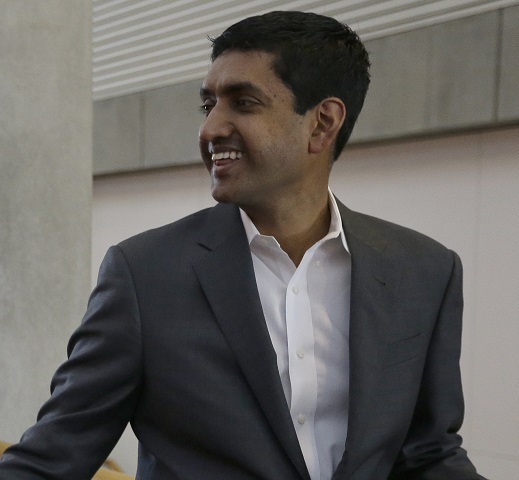by Will Tucker on June 1, 2016

Democratic candidate Ro Khanna (Calif.) has received more money from the securities and invesetment industry than anyone else running for a House seat. (AP Photo/Ben Margot)
Hedge fund and other private equity managers have created a huge imbalance in the campaign finance picture with their massive contributions to super PACs. But as an industry, Wall Street writ large makes its mark in the simplest of ways: by simply giving more, by far, to candidates than any other interest group.
Naturally, though, not all candidates are created equal.
A quintet of House incumbents and challengers are far more reliant on the financial world to fuel their campaigns than most others running for a seat in that body -- they've received twice as much from the securities and investment industry in the 2016 election cycle as they have from their next highest donor industry, OpenSecrets' Anomaly Tracker shows. A bipartisan bunch, they are: Reps. Seth Moulton (D-Mass.), Scott Garrett (R-N.J.) and David Jolly (R-Fla.) and candidates Ro Khanna (D-Calif.) and Andrew Heaney (R-N.Y.).
The two non-incumbents have raised the most from the Wall Street-centered industry. That makes sense, considering they're running to represent two of the country's most prominent Valleys in the financial realm: Silicon and Hudson.
Khanna, a former Obama administration official headed into a rematch in the California Democratic primary this month with Rep. Mike Honda (D-Calif.), has long projected himself as the new, young face that can represent Silicon Valley better than the Baby Boomer currently occupying the seat and collecting ethics complaints.
That means, apparently, building a donor base of investors: Khanna has raised $480,500 from the securities and investment industry compared to $170,752 from his next top iindustry, electronics manufacturing. His top company donors so far are Google's parent company Alphabet Inc. and a number of venture capital firms. Khanna lost his bid to unseat Honda in 2014 by fewer than 5,000 votes. That year, he raised $629,950 from financiers, compared to $261,345 from electronics manufacturing.
In New York, the race for the Hudson Valley district would pit Heaney, who has collected $270,369 in contributions from the securities and investment industry, against the crusading law professor Zephyr Teachout, who wants to overhaul the campaign finance system. That's if he wins his primary later this month.
Heaney managed to raise the money from investors despite throwing himself headfirst onto the Donald Trump bandwagon ahead of the New York presidential primary. In an ad, according to the Albany Times-Union, Heaney says that, like Trump, "we don't take special interest money and we can't be bought."
Heaney's donor base looks nothing like Trump's, though -- not least because the nation's top political-donor investors mostly have a well-documented aversion to the expected Republican presidential nominee. Heaney's campaign is so heavily financed by Wall Street that real estate, his next top industry, has barely contributed a quarter of the $270,000 contributed by investors.
For the sitting members of Congress who look to investors for a big majority of their campaign cash, there's a bipartisan spirit to the industry's contributions. Moulton, the Democrat from Massachusetts, has raised $255,799 from Wall Street; Garrett, of New Jersey, has raised $213,755 and Jolly, of Florida, has raised $147,550 -- he's now running for the Senate seat to be left open by failed presidential candidate and retiring Sen. Marco Rubio (R-Fla.).
Much of the loot has come from the industry's PACs, which have shelled out $31,949 and $21,000 to Moulton and Jolly respectively, while they've given Garrett -- who sits on the House Financial Services Committee. $104,000 so far. The money comes from the likes of Silvercrest Assett Management and Stephens Group.
Goldman Sachs and Warren Buffett's Berkshire Hathaway. stand out as big backers of Moulton, whereas the equity investment firm Cantor Fitzgerald stands squarely behind Jolly.
